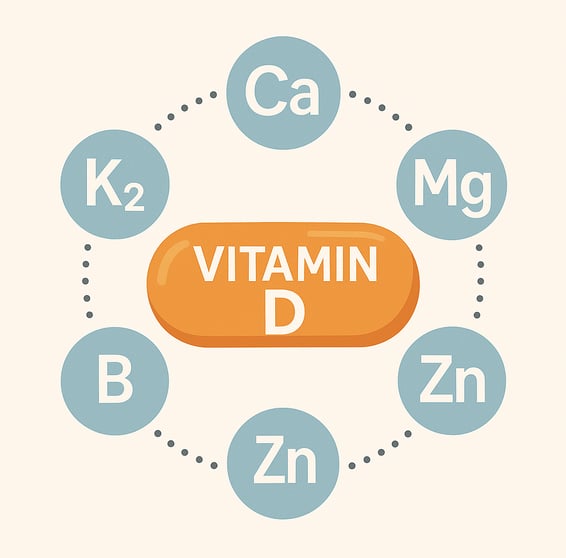Understanding Vitamin D: The Importance of Co-Factors
“Discover why vitamin D needs co-factors like K2, magnesium, boron, and zinc to work properly. Learn how taking vitamin D alone could do more harm than good.”
Bryan Cook
7/15/20252 min read


Vitamin D is often called the “sunshine vitamin,” essential for healthy bones, a robust immune system, and even mood regulation. But what many people don’t realise is that taking vitamin D on its own may not deliver its full benefits — and in some cases, could even cause unintended imbalances. That’s where co-factors come in.
Why Vitamin D Needs Co-Factors
Vitamin D doesn’t work in isolation. To be absorbed, activated, and used effectively by the body, it relies on a network of other nutrients known as co-factors. Think of these as helper nutrients that allow vitamin D to do its job properly. Without them, your vitamin D levels might rise on a blood test, but your body could still struggle to use it where it matters most.
Key Co-Factors and Their Roles
Vitamin K2
Vitamin D helps your body absorb calcium, but vitamin K2 ensures that calcium is deposited in your bones and teeth rather than in soft tissues like arteries. Without sufficient K2, increased calcium from vitamin D can end up in the wrong places, potentially leading to arterial calcification.Magnesium
Magnesium is required for converting vitamin D into its active form. It’s involved in over 300 enzymatic reactions, including those that manage vitamin D metabolism. Low magnesium may result in vitamin D “resistance,” where you need more vitamin D to achieve the same effect — or experience side effects like cramps and palpitations.Boron
Boron helps extend the half-life of vitamin D, keeping it active in your system longer. It also supports bone health and hormonal balance.Zinc & Vitamin B5
Zinc plays a role in immune modulation and cellular growth, both of which are influenced by vitamin D. Vitamin B5 (pantothenic acid) supports adrenal health, indirectly helping your body respond to inflammation and stress — areas also regulated by vitamin D.
The Risks of Taking Vitamin D Alone
When people supplement with high doses of vitamin D without addressing these co-factors, problems can arise.
These may include:
Calcium imbalance leading to deposits in the arteries or kidneys.
Magnesium depletion, worsening fatigue, muscle twitching, or even heart rhythm issues.
Reduced efficacy, meaning you may not get the immune, bone, or mood benefits you’re expecting despite taking large doses.
That’s why well-designed supplements like Ultimate D+ include these critical co-factors, taking a more holistic approach to supporting vitamin D’s complex pathways in the body.
Conclusion
Vitamin D is undeniably important, but it doesn’t work solo. Supporting it with the right co-factors — K2, magnesium, boron, zinc, and B vitamins — ensures you’re not just increasing levels on a lab report, but actually promoting vibrant health at the cellular level.
